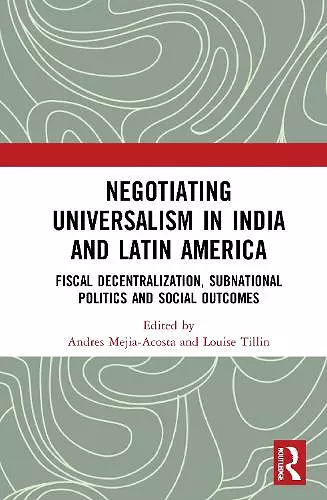Negotiating Universalism in India and Latin America
Fiscal Decentralization, Subnational Politics and Social Outcomes
Andrés Mejía Acosta editor Louise Tillin editor
Format:Hardback
Publisher:Taylor & Francis Ltd
Published:16th Jun '21
Currently unavailable, and unfortunately no date known when it will be back
This hardback is available in another edition too:
- Paperback£41.99(9780367709419)

This book explores how vertical inter-governmental political and fiscal bargains and horizontal variation in political, social and economic conditions across regions contribute to or undermine the provision of inclusive and sustainable social policies at the subnational level in Latin America and India.
The question of how to advance universal social rights while reducing territorial inequalities has been a central dilemma for Latin America and India. After several decades of ambitious decentralization reforms in both regions, the balance between local accountability versus centralized planning remains a theoretical and empirical problem in need of systematic exploration. The chapters in this volume incorporate both federal and decentralized unitary states, pointing to common political tensions across unitary and federal settings despite the typically greater institutionalization of regional autonomy in federal countries. The contributors examine the territorial dimension of universalism and explore, in greater and empirical detail, the causal links between fiscal transfers, social policies and outcomes, and highlight the political dynamics that shape fiscal decentralization reforms and the welfare state.
The chapters in this book were originally published as a special issue of Regional & Federal Studies.
"How doemerging economies balance subnational self-rule with welfare universalism? Negotiating Universalism brings together a superb team of experts to compare the effects of decentralization on social rights, policy, and inequality across India and Latin America. This timely and socially relevant collection will be essential reading for scholars, students, and practitioners."
Liesbet Hooghe, W.R. Kenan Professor in Political Science, University of North Carolina at Chapel Hill, USA.
"How do multi-level states balance sub-state autonomy with solidarity? This issue takes centre-stage in multi-level politics but remains underexplored especially for countries with middle or lower levels of development. Mejia Acosta and Tillin have brought together a team of outstanding social scientists to explore this issue across a range of Latin American states (federal and non-federal alike) and India. For scholars who are interested in how the design of democratic and multi-level institutions influence the delivery of welfare, this book is essential reading."
Wilfried Swenden, Professor of South Asian and Comparative Politics, University of Edinburgh, UK.
"This innovative book examines one of the most pressing challenges facing countries around the world today: how to universalize access to social services while simultaneously reducing inequality in the provision of these services across territory. Through rigorous empirical studies of India and Latin America, the contributors to this volume provide convincing answers to a range of critical questions, including how fiscal transfers might either increase or decrease territorial inequality, how local political elites use decentralized resources, and how territorial unevenness should inform the way we measure the welfare state itself."
Kent Eaton, Professor of Politics, University of California Santa Cruz, USA.
"How doemerging economies balance subnational self-rule with welfare universalism? Negotiating Universalism brings together a superb team of experts to compare the effects of decentralization on social rights, policy, and inequality across India and Latin America. This timely and socially relevant collection will be essential reading for scholars, students, and practitioners."
Liesbet Hooghe, W.R. Kenan Professor in Political Science, University of North Carolina at Chapel Hill, USA.
"How do multi-level states balance sub-state autonomy with solidarity? This issue takes centre-stage in multi-level politics but remains underexplored especially for countries with middle or lower levels of development. Mejia Acosta and Tillin have brought together a team of outstanding social scientists to explore this issue across a range of Latin American states (federal and non-federal alike) and India. For scholars who are interested in how the design of democratic and multi-level institutions influence the delivery of welfare, this book is essential reading."
Wilfried Swenden, Professor of South Asian and Comparative Politics, University of Edinburgh, UK.
"This innovative book examines one of the most pressing challenges facing countries around the world today: how to universalize access to social services while simultaneously reducing inequality in the provision of these services across territory. Through rigorous empirical studies of India and Latin America, the contributors to this volume provide convincing answers to a range of critical questions, including how fiscal transfers might either increase or decrease territorial inequality, how local political elites use decentralized resources, and how territorial unevenness should inform the way we measure the welfare state itself."
Kent Eaton, Professor of Politics, University of California Santa Cruz, USA.
ISBN: 9780367709402
Dimensions: unknown
Weight: 417g
184 pages